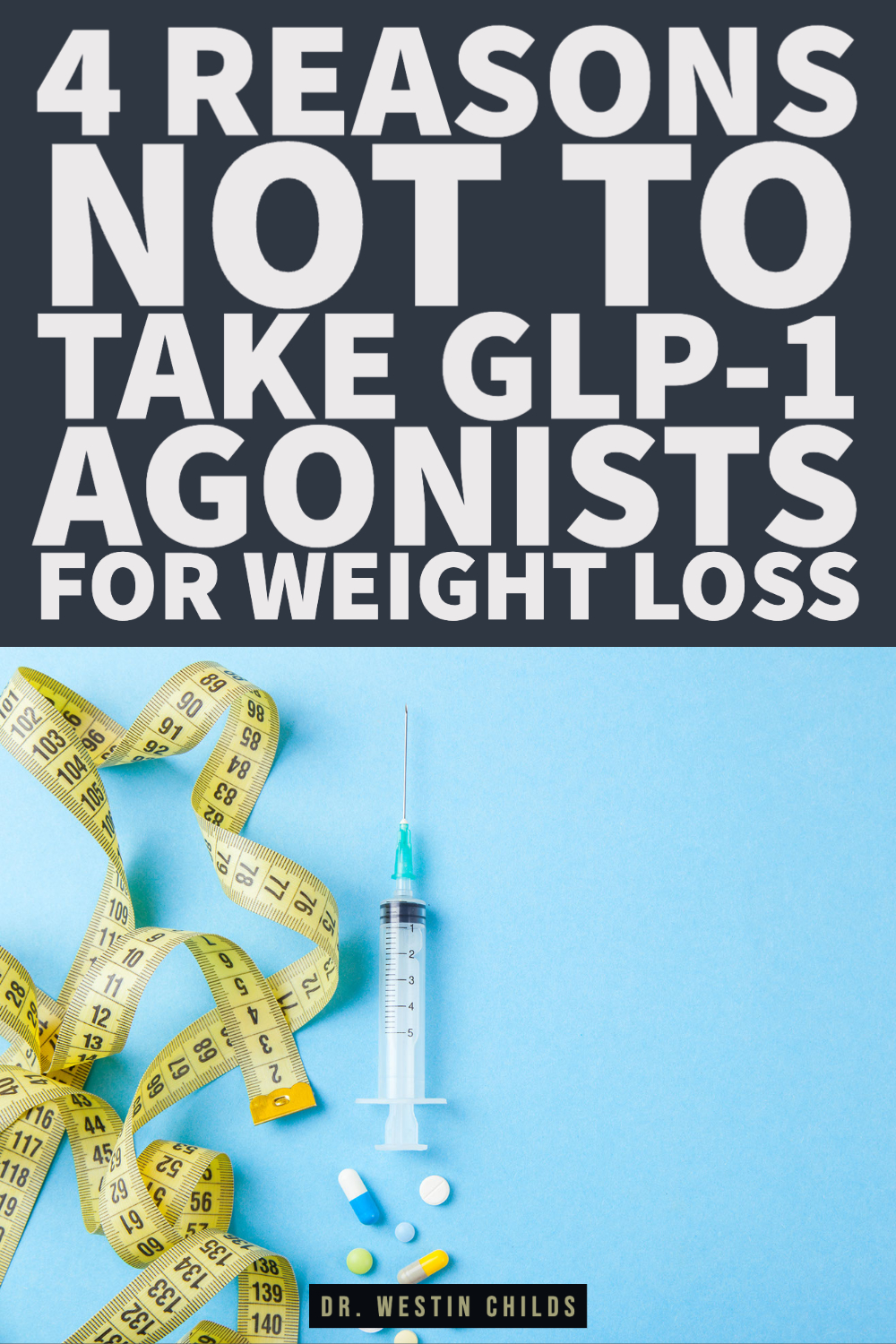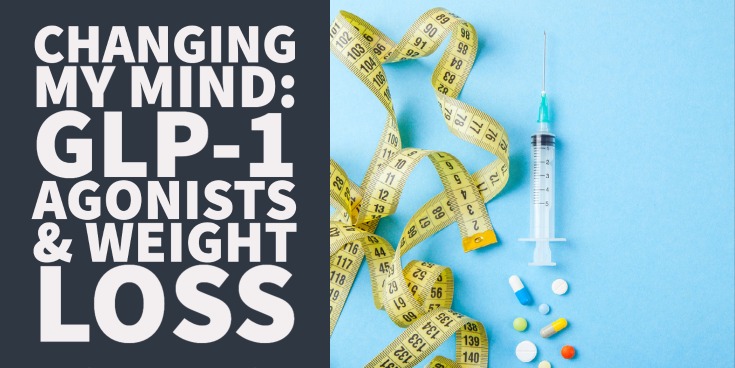GLP-1 agonists have gained a tremendous amount of attention over the last few years for their potential to help people lose weight.
And while this may seem amazing, especially for people who have struggled with weight loss their entire life, they may not be the miracle drugs you think they are.
Just to catch anyone up who is unfamiliar with the term GLP-1 agonist, this term refers to a class of medications that all act on the GLP-1 receptor.
Medications that fall into this class include:
- Wegovy (one of the most popular now)
- Semaglutide
- Saxenda
- Victoza
- Trulicity
- Byetta
- Bydureon
- Ozempic
- Rybelsus
- Mounjaro
- And so on…
These medications were originally created for diabetes and blood sugar control but it was found that they had a powerful impact on weight.
From there, the rest is history.
People like me were using them off-label to help patients lose weight and, well, they worked very well.
It wasn’t common for me to take patients who were unresponsive to the most aggressive weight loss therapies (including bariatric surgery), put them on these medications, and watch them lose weight.
Yes, I definitely had these patients on more than just this medication (we used a combination of hormones, dietary changes, fasting, and so on), but there’s no denying that these medications made everything a lot easier.
Eventually, the pharmaceutical companies caught wind of what was going on and they created new medications that were specifically designed for weight loss.
So, now, we have several medications in the class of GLP-1 agonists designed for diabetes and some specifically designed for weight loss (even though they are exactly the same and just differ in dosing).
I’m not here to talk about the pharmaceutical companies, though, I’m here to talk about whether or not these medications are safe to take for people interested in losing weight.
If you were to ask me a few years ago what I thought about them, I would have given you raving reviews of their use.
But nowadays, it’s safe to say that my opinion on these medications has changed quite a bit.
I went from recommending them to many people to suggesting that they only be used as a last resort.
And, look, I’m not just saying this as someone who is only slightly aware of their existence.
I’m saying this as someone who frequently prescribed and recommended them back when I was practicing medicine.
I even created my own titration schedule that allowed my patients to obtain benefits from their use as long as possible.
Back when I was frequently recommending them, not much was known about their long-term side effects.
And as more information has come about, I’ve changed my mind about how I think about these medications.
Here’s why:
DOWNLOAD FREE RESOURCES
Foods to Avoid if you Have Thyroid Problems:
I’ve found that these 10 foods cause the most problems for thyroid patients. Learn which foods you should avoid if you have thyroid disease of any type.
The Complete List of Thyroid Lab tests:
The list includes optimal ranges, normal ranges, and the complete list of tests you need to diagnose and manage thyroid disease correctly!
Problem #1: These Medications Do Have Harmful Side Effects
One of the biggest issues with this class of medications is their ability to cause serious side effects.
I’m not just talking about long-term side effects (which we will get into in just a minute), I’m talking about short-term side effects as well.
It wasn’t uncommon for me to get emails from patients telling me that they couldn’t keep anything down because they were so nauseous after their first injection.
I had plenty of others who would complain of fatigue, headaches, diarrhea (1), and other unwanted symptoms as well.
There are definitely ways to mitigate these symptoms, though, and, at the end of the day, most people would rather deal with some minor inconveniences if they were able to lose 50+ pounds or more of weight, but these symptoms are still troublesome.
No matter how you look at it, they are an indication that something is changing in the body.
The more powerful the symptoms, the more powerful the change.
And I definitely think that, in general, it’s far healthier to avoid medications and treatments that cause serious side effects if at all possible.
If this were the only issue then I wouldn’t have much trouble recommending them, but it isn’t…
Problem #2: They May Increase Your Risk of Developing Thyroid Cancer
A more concerning problem is the connection between the development of thyroid cancer and the use of these medications.
This was always a potential concern, even back when I was frequently prescribing them.
But back then we didn’t have as much data as we do now.
And the data that existed back then wasn’t very convincing.
It looked like it was probably just some error in reporting or a just a coincidence.
Well, now, that doesn’t seem to be the case.
Newer studies that have come out do suggest that there is a real connection between thyroid cancer and the long-term use of GLP-1 agonists.
Current data suggest that this risk is around 0.07%, which isn’t huge, but it is real.
You may look at that number and not think it’s a big deal, but it is for the 2,500 people who acquired thyroid cancer as a result of their treatment!

I should also point out that there’s still a debate going on right now on whether there is a real connection between cancer and GLP-1 agonist use with some studies suggesting there is no link.
And, even if there is a real risk of developing thyroid cancer with their use, it still may make more sense to use them because losing weight will reduce your overall risk of cancer as well.
So I certainly wouldn’t fault you for wanting to use them even in the face of this data.
But, from my perspective, knowing that treatments exist right now that help you obtain a healthy weight, why expose yourself to unneeded risk?
Problem #3 (Probably the Worst?): They Result in Muscle Loss
Let’s put aside the short-term and long-term side effects that I just mentioned and focus on something more important:
The type of weight loss that GLP-1 agonists cause.
This part can be confusing for a lot of people because, if you are like most people, you are probably used to assessing your weight by looking at numbers on a scale.
If the scale goes down, you assume you are losing fat.
If the scale goes up, you assume you are gaining fat.
Even though this method of tracking your weight works somewhat, it’s probably the worst way to assess whether or not you are actually losing fat mass when you undergo any type of diet or weight loss treatment.
Most of the time, the types of weight loss that people experience when the scale goes down is a combination of fat mass AND muscle mass.
And, frankly, if you are doing anything that causes you to lose muscle mass you are taking two steps backward for every one step forward.
It looks like much of the weight that people lose when they take GLP-1 agonists is muscle mass and not necessarily fat mass.
Yes, they do lose fat mass and adipose tissue, but it comes at the expense of muscle mass as well.
Various studies have attempted to quantify how much fat versus muscle mass is being lost when using GLP-1 agonists and the results vary anywhere from 20 to 50% of total weight loss as lean body mass (3) (muscle mass).
This means that in the worst-case scenario when you lose weight using a GLP-1 agonist, the weight you lose when you weigh yourself is 50% from a loss of muscle mass and 50% from a loss of fat mass.
The best-case scenario is that the weight you lose on your scale represents 80% fat mass loss and 20% muscle mass loss.
These numbers are terrible!
And it puts the percentage of fat mass lost and percentage of muscle mass lost associated with GLP-1 agonists in line with therapies like bariatric surgery.
This is why I said losing weight with a GLP-1 agonist is like taking two steps backward:
When you drop your muscle mass by 50% you are losing a huge chunk of daily caloric burn.
The fewer calories you burn at rest the easier it will be for you to gain weight and the harder it will be for you to lose weight.
And, by the way, it’s INCREDIBLY difficult to rebuild that lost muscle mass!
The older you get the harder it is to build muscle mass and it’s already difficult as is.
Problem #4: They Are Used as a Crutch to a Healthy Lifestyle
Another huge problem is that many people end up using GLP-1 agonists because it’s the path of least resistance.
It’s far easier to just take an injection once a week or once a day than it is to…
- Learn how to cook delicious-tasting food.
- Find time to exercise each and every day.
- Spend time researching and figuring out what works for your body.
- Optimizing your life for things like sleep, stress, and your relationships.
It’s clear to me after helping people lose weight that the ones who succeed are the ones that truly understand the necessity of changing their lifestyle.
If you are in the mindset that a medication is going to solve your problems, then you are not going to obtain the weight that you desire long-term.
Yes, a GLP-1 agonist may temporarily get you there, but it’s not going to keep you there.
The healthiest people I know all understand this simple but important fact.
Problem #5: You May Never Be Able to Get Off of Them
One of the main reasons that I was able to tolerate the thought of using these medications (even knowing all of these things) is that my intention was always that my patients would eventually be able to get off of them.
I thought to myself:
“Sure, these medications do have some bad side effects, but if they are only used in the short-term then the benefits definitely outweigh the cons”.
And, for the most part, I still believe that.
But the problem is that’s not how they are being used.
The majority of people who start them, don’t stop taking them.
They are either unable to reach their target goal while taking them, or they find that their weight creeps up after they try to stop using them.
Either way, they end up taking them indefinitely while exposing themselves to unneeded risks.
Bottom Line?
I’m not going to fault anyone for using these medications, but knowing what I know now, I can’t in good conscience make a blanket recommendation for people (especially thyroid patients) to use them.
I do fully understand, though, that there will be situations in which using them makes some sense.
Here’s an example:
Imagine you are someone who REALLY wants to get off your weight as quickly as possible.
You are also willing to put in the work to meaningfully change your lifestyle.
If you use a combination of a GLP-1 agonist along with treatments like a whole-food diet and regular exercise, with the intent to stop taking it when you reach your target goal, then that’s probably ok.
But even in this situation, the duration of treatment using the GLP-1 agonist shouldn’t be longer than 6-12 months (in my opinion).
And, for the record, I still think it’s possible for most people to obtain their ideal weight simply through the control of their hormones and the changing of their lifestyle.
At the end of the day, I would recommend that these medications be avoided for weight loss unless all other treatments have failed.
Scientific References
#1. ncbi.nlm.nih.gov/pmc/articles/PMC5397288/
#2. pubmed.ncbi.nlm.nih.gov/36356111/
#3. ncbi.nlm.nih.gov/pmc/articles/PMC6769337/









Hi,
I read another article and there’s a few other “Thyroid Specialists” saying the use of weight loss drugs can reset a damaged metabolism. Wondering if that’s true.
Hi JK,
I’ve used many prescription medications off-label for purposes of weight loss but I’ve yet to use any that have a meaningful impact on repairing a damaged metabolism. The two therapies that work best in this regard are fasting and reverse dieting which are both related to calories.
Hello!
I bought your complete program when it was for sale in 2021, and it was the only thing that helped me to lose weight and put most of my symptoms into remission.
I am wondering.. is there anything else you’d change in the plan since then?
I’ve recently relapsed and am having the same issues as before, a couple pounds have come on, and I am restarting. Thanks!
Hi Kristina,
I’ve changed my mind on several topics but it’s hard for me to remember what exactly was in the plan in 2021. I would recommend reaching out to my team at he***@********ed.com and they will send you an updated version so you can compare.
Have you looked into low dosing GLP1, much like LDN… great success, no side effects either? Dosages start at 1 unit, end at .50mg (i think that’s around 13 units), compounded only. Included in this is cycling 3 weeks ON, 1 week OFF. I’m starting to read a lot about using this type of protocol, your opinion?
Hi CathyR,
I developed my own dosing method many years ago which can be found here: https://www.restartmed.com/victoza/
I’m not sure how other providers are using it nowadays since I no longer recommend it, but back when I was, the best way was always lower doses with very slow titration to prevent tolerance.
I do recall using very small dosing back then with variable success, but that was only with a select few medications. Lower dosing may work better now with the more powerful options that exist. But the question still remains, is it actually necessary? I would say for most people, it isn’t.
Is there anything else you’d change about your program from a few years ago?
Hi Kristina,
Yes, many things. I’ve written about some of them in my more recent articles.
I’d appreciate it if you would link some so I know what to change going back through the program.
Hi Kristina,
Just reach out to my team at he***@********ed.com and they can make sure you have the most updated version. I’m still actively working on it, slower than I’d like, but there’s an updated draft that can be sent.
I 100 percent agree with everything in this article! Well written and informative. I’m so tired of everyone thinking these drugs are the answer. the loss of lean muscle mass alone should deter anyone from wanting to take this class of drugs and reserve for last resort use. Thanks for a great article!
Hi Lisa,
I agree that the loss of lean muscle mass is probably the most severe consequence. That, coupled with the fact that most people will regain all of their lost weight upon cessation of the meds, means they will be in a worse position than when they started.
Any thoughts on Allulose and thyroid or muscle mass impact? Allulose is reported to be a GLP-1 agonist although not used as a weight loss drug, it is becoming more popular in the low -carb, keto world.
Hi Robin,
Yes, I’m planning on writing an article on that topic which should hopefully be out in the coming weeks.
I learned from Dr. Brian Ardis, DC, who looked into Ozempic, discovered it has Gila Monster venom in it. This venom paralyzes the stomach so food can’t be digested and absorbed and just sits in the stomach causing nausea and cyclical vomiting. That’s how this drug works for weight loss. I think it’s safe to assume, all these similar drugs have venom in them. But, unfortunately, many people after stopping the drug still had vomiting issues even after a year! These are very dangerous drugs. They not only inhibit food digestion and nutrient absorption, but can cause serious mineral and vitamin deficiencies as well.
Respect for changing your mind in the face of new data. I have heard some horrendous stories, with one lady saying she couldn’t even tolerate a spoonful of food without throwing it up and she felt like food was sitting in her stomach and going nowhere. With the low gut motility and reflux disease so many people with hashimotos experience, that’s not something I’d want to add.
Hi Andrea,
The nausea was definitely a common side effect, but it was usually tolerable, depending on the dose. More recently, I’ve seen some case reports of delayed gastric empyting that persists even after stopping the medication. It seems like it’s a very rare side effect, but these sort of things expose themselves when the sample size of people using a medication reaches the tens of millions.
I’ve been on Zepbound for 3.5 months (2 months on 2.5 and 1.5 months on 5) and have only lost 5 pounds total. I’ve also had severe side effects (nausea, fatigue, muscle aches) and have eaten so little that I can’t believe how little the loss is. I do exercise (when I have the energy) and have upped protein and cut sugar. Do some people just not respond to these meds? I also have hypothyroidism (medicated with cytomel and Tirosint). Thanks!
Hi Maggie,
Yes, some people simply don’t respond to them. You can always try different medications within the same class, though, as that sometimes works.
I would like to know if anyone has had any serious side effects – from those you have treated with these drugs.
Hi Wise Lady,
None that I’ve treated.
I’m wondering if patients on these drugs actually go into catastrophic thyroid deficiency, which results in a sort of anorexia and rather dramatic weight loss (about 3 pounds a week) but with all the health effects one would expect from zeroing out your thyroid.
“Maggie” above sounds like what I’d expect from this scenario (exact list of side effects).
[Little known but supported in the research, teenage anorexia is due to temporary thyroid suppression when estrogen arrives in force. Result: nothing tastes like food.]
Hi Reziac,
It’s unlikely that they cause significant thyroid dysfunction as that would be evident with labs and picked up with the existing research studies, but there’s no question they do cause muscle loss, which is a huge problem.